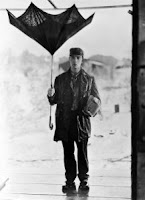 Germany
GermanyLength: 117 minutes
Director: Fritz Lang
Cast: Peter Lorre, Ellen Widmann, Inge Langut, Otto Wernicke, Theodor Loos
Eric's Impressions: One of cinema's most haunting films, this one will leave you confused in the end as you will find some sympathy for a person who kills children. Played brilliantly by the always memorable Peter Lorre, the main character is a man running from the police for the crimes he has committed. At first you want the murderer to be caught, but when you find out how corrupt the police and government of this German city are, you almost want him to get away. Lorre will creep you out with his pre-killing whistling and overall demeanor. The stories of how director Fritz Lang mistreated his actors are legendary, but in a way they may have assisted Lang in reaching a higher level of acting prowess.
Natalie's Impressions: What struck me most about this film was its timeless message. This film is still very relevant today and that is a frightening fact. When Eric first told me about this film, I swore I would never watch it because it sounded like a really stupid horror movie but it is not at all a stupid horror movie. Above all, it is sad. Very very very sad. I am glad I did finally see it because it moved me a great deal. It is a film that will stay with you for a long time. A perfect film, in my opinion. The timing of the scenes, the length of them, the action-reaction time of the actors with each other is flawless. This is superb directing by Lang.
COUNTDOWN: Just 953 movies to go!


































_02.jpg)

